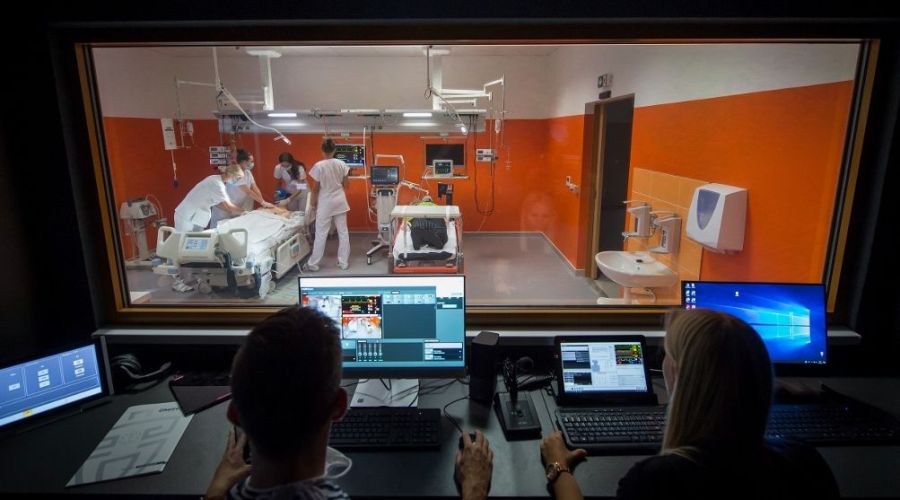International Intensive Care Week will bring educators from European countries to the FHSS USB simulation centre

From 22 August, the Faculty of Health and Social Sciences of the University of South Bohemia will be hosting the attendees of the International Intensive Care Week, which will focus on exchanging experiences with simulation instruction in nursing in order to boost skills, improve the effectiveness of the use of this teaching method in instruction and establish closer mutual cooperation. The organisers are expecting about 40 educators from 13 European countries and Turkey.
It is the largest event so far during which FHSS USB opens the simulation centre to the professional public. 'The main goal is to improve the quality of teaching through the use of modern methods. We try to offer students new approaches that can be applied in training general and paediatric nurses, midwives as well as paramedics,' said the head of the simulation centre, Mgr. František Dolák, Ph.D. The first comprehensive simulation centre for non-medical medical disciplines in the Czech Republic was opened by FHSS USB in autumn 2020. Experts from FHSS USB gathered inspiration for this project in Finland, Spain, the USA and Latvia. Many colleagues will now come to České Budějovice and see the specialised rooms faithfully imitating the reality in which healthcare professionals work for the first time.
The week-long gathering is held in the building at 26 U Výstaviště Street, where hospital rooms, a delivery room, an intensive care unit and an authentic ambulance cabin are located in the basement. Simulation teaching is made possible by control rooms and other areas where educators observe and evaluate the work of students, who are encouraged to be as independent as possible. Everything is equipped with functional medical devices and the role of patients is played by sophisticated computer-controlled mannequins that simulate breathing, pulse or heart activity, etc. Instruments can be connected to them and the simulators react to the procedures performed and the instructor can communicate with the student through them.
Many variations of the situations that healthcare professionals have to deal with can be pre-programmed for instruction – and it is these scenarios that will become an important part of the programme of the International Intensive Care Week. The morning will be devoted to theory and discussions, which other international participants can join online. Each afternoon will be filled with workshops directly in the individual rooms of the simulation centre. ‘We have approached all partner faculties where Nursing is taught. Among other things, we have offered them the premises with the proposal that they can present their own scenarios and thus participate in the exchange of experience, which is what we are all about,’ František Dolák explained. He specified that the organising FHSS USB Institute of Nursing, Midwifery and Emergency Care had invited both colleagues who already have simulation centres at their faculties and those who are still considering them and want to become more familiar with this form of instruction.
The Faculty of Health and Social Sciences of JU has long been focused on finding innovative ways of instruction that will allow students the closest possible connection with the practice and the highest quality training of all skills in the most realistic environment without endangering the patient due to possible mistakes of students (beginners in the field). This is why the faculty also wants to help public schools that already use simulation instruction to collaborate more than they have been so far. The times have favoured this – while previously the aim was to protect their know-how in these unique and expensive projects, developments have progressed over time and shown how needed and necessary collaboration in this field is. ‘I am very pleased that this offer from our faculty has attracted so much interest from our colleagues from abroad. For us, it is not only an important opportunity to exchange experiences and gain new impulses, which we will then use at home but also a chance to contribute to the improvement of the instruction of these courses at other faculties in the world – including those countries from which we have previously drawn inspiration,’ said Dean Mgr. Ivana Chloubová, Ph.D.
The two-storey building of the Simulation Centre for Health-oriented Fields, which is an extension to the existing building of the USB Faculty of Health and Social Sciences, cost approximately CZK 58 million including equipment. The centre was financed by the EU Operational Programme Research, Development and Education (faculty's co-financing in the amount of 5%). The construction took two years and instruction started in the autumn of 2020. By observing strict anti-epidemic measures, it was possible to maintain instruction here even during the months when most schools were closed due to the Covid-19 pandemic.